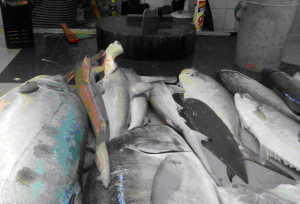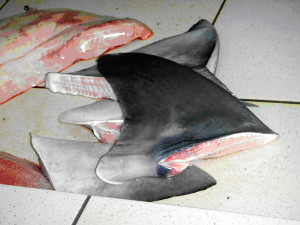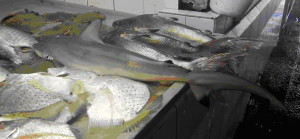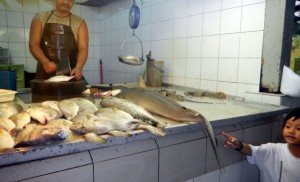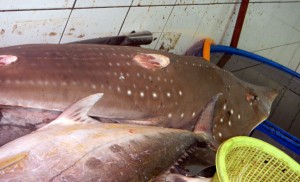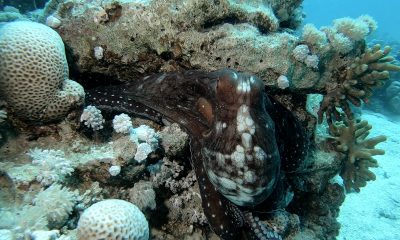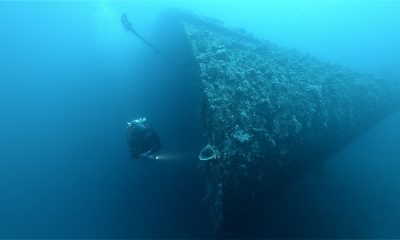Marine Life & Conservation
Recent updates about the Shark situation in South East Asia

As we all know an approximate number of 100 million sharks are killed every year to support the demand for shark fin soup, mainly from countries in South East Asia.
In China the growing middle class are craving to eat this dish which was classified as a traditional wedding treat and served at state banquets; however, many Chinese hotels like Shangri-La has recently banned the soup from their regular menu and many other high class restaurants in the neighboring countries are following suit.
BAD NEWS
Last week terrible news came from one of Hong Kong´s conservationists groups – a whale shark factory was found that processed over 600 Whale Sharks annually. These giant animals are hunted not only because of their valuable fins but also for their liver. A shark liver can be a third of the size of a sharks body and the oil is an essential ingredient in the preparation of cosmetics like lipsticks and creams.
Alex Hofford and Paul Hilton of WildLifeRisk, the conservationists group that discovered the factory, said:
“How these harmless creatures, these gentle giants of the deep, can be slaughtered on such an industrial scale is beyond belief, and all for human vanity; lipsticks, face creams, health supplements, shark fin soup restaurants. We firmly believe the trade must stop, and it must stop now, or else these animals will eventually face extinction.”
When resources run scarce, old battles resurface; China is again debating with surrounding countries like the Philippines, Vietnam, Taiwan, Malaysia and Brunei over South China Sea fishing rights.
China has imposed a new law that bans foreign vessels in “Beijing claimed areas” and the Philippines has said this is illegal and a serious threat to the peace in the area, since China claims almost the entire South China Sea as their own. The Philippines has tried to arbitrate under the UNCLOS (United Nations Convention on the Law of Sea) to make Chinas claim illegal.
Chinese official sources said “the fisheries conservation regulations had been issued and published by China since the 1980s. There was no reaction from the Philippines then and yet these are the very same rules that are being attacked today.”
To be continued….
In other areas in the Philippines, Marine Biologists are criticizing fisherman over their new method of making money; they are “hand feeding” whale sharks in order to attract tourists.
This practice has become highly popular, and since sightings of these giants is practically guaranteed, the fishermen can earn a lot more money and spend less time working too.
The Marine biologists claim this practice disturbs the whale shark’s natural behavior and increases disease and parasites, and they are conducting a study to observe the change over time.
These kind of stories where conservation only takes place when there is a demand or monetary interest will unfortunately become more common in the future.
But isn’t it better to have the whale shark hand fed than in whale shark fin soup?
GOOD NEWS
Indonesia has created the country’s first shark and manta ray sanctuary. Created at the beginning of 2013 and based in Raja Ampat, it’s the first in the Coral Triangle. 6 months later, Komodo with it´s 7,000 sq km has also joined other areas of Indonesia to protect its sharks and rays.
Indonesia is an important country because it’s one of the world’s biggest fisher and exporter of sharks, so the sanctuaries are extremely vital for the area and a good sign of a will to save wildlife for tourism (as sharks and rays bring in more for money alive then dead).
The Sultanate of Brunei has become the first Asian country to ban shark finning, effective from January 2014. Routine checks on establishments will be conducted to ensure the ban is followed.
The Sultan Hassanai Bolkiah Mu’izzaddin Waddaulah has banned the catch and landing of all shark species from the waters of Brunei Darussalam, as well as shark fin sales in the domestic market, and the importation and trade of shark products.
This is a law that has not even been achieved in countries like the United States, so for an Asian country this is very progressive.
Shark meat used to be sold at the market at very cheap prices, only the fins are more expensive and most of the times already sold before reaching the market.
Photos taken before the implementation of the law for shark Finnning, Fish market, Jerudong , Brunei Darussalam in December 2013.
Neighboring areas to Brunei like Northern Sabah are trying to follow the steps of Brunei, but the Southern region of Sarawak is far from acknowledging this law. The general manager of the Protected Areas and Biodiversity Conservation Division Oswald Braken Tisen said recently:
“Not all sharks are protected species, and selling of shark’s fin and consuming it is still not against the law.”
The Shark experts’ opinions are unanimous: “Laws to restrict trade will mean little unless there are total bans on fishing.”
After checking up on how the new law about shark protection is affecting the fish market in Jerudong in Brunei Darussalam, I attach these two pictures from the 6th of February.
Sharks are still openly displayed on the counter, some still with their fins, and some guitar fish without fins. I have tried to reach the Ministry´s fisheries for a comment but they are still busy with Chinese New Year celebration and are proving difficult to reach.
I’ll try again next week….
Marine Life & Conservation
Leading UK-based shark conservation charity, the Shark Trust, is delighted to announce tour operator Diverse Travel as a Corporate Patron

 Corporate Patrons provide a valuable boost to the work of The Shark Trust. The Trust team works globally to safeguard the future of sharks, and their close cousins, the skates and rays, engaging with a global network of scientists, policymakers, conservation professionals, businesses and supporters to further shark conservation.
Corporate Patrons provide a valuable boost to the work of The Shark Trust. The Trust team works globally to safeguard the future of sharks, and their close cousins, the skates and rays, engaging with a global network of scientists, policymakers, conservation professionals, businesses and supporters to further shark conservation.
Specialist tour operator Diverse Travel has operated since 2014 and is committed to offering its guests high quality, sustainable scuba diving holidays worldwide. Working together with the Shark Trust will enable both organisations to widen engagement and encourage divers and snorkellers to actively get involved in shark conservation.
“Sharks are truly at the heart of every diver and at Diverse Travel, we absolutely share that passion. There is nothing like seeing a shark in the wild – it’s a moment that stays with you forever!” says Holly Bredin, Sales & Marketing Manager, Diverse Travel.
“We’re delighted to celebrate our 10th year of business by becoming a Corporate Patron of the Shark Trust. This is an exciting partnership for Diverse and our guests. We will be donating on behalf of every person who books a holiday with us to contribute towards their vital shark conservation initiatives around the world. We will also be working together with the Trust to inspire divers, snorkellers and other travellers to take an active role – at home and abroad – in citizen science projects and other activities.”
Paul Cox, CEO of The Shark Trust, said:
“It’s an exciting partnership and we’re thrilled to be working with Diverse Travel to enable more divers and travellers to get involved with sharks and shark conservation. Sharks face considerable conservation challenges but, through collaboration and collective action, we can secure a brighter future for sharks and their ocean home. This new partnership takes us one more valuable step towards that goal.”
For more information about the Shark Trust visit their website here.
For more about Diverse Travel click here.
Marine Life & Conservation
Shark Trust Asks Divers to help with Shark Sightings this Global Citizen Science Month

 Whether you are stuck for ideas of what to do with the kids or are off on the dive trip of your dreams. You can get involved in Citizen Science Month and help the Shark Trust by providing vital data about sharks are rays both close to home and further afield.
Whether you are stuck for ideas of what to do with the kids or are off on the dive trip of your dreams. You can get involved in Citizen Science Month and help the Shark Trust by providing vital data about sharks are rays both close to home and further afield.
In addition to reporting the sharks and rays you see on your dives, the eggcases you find on the beach, the Shark Trust is looking for some specific data from divers who are asked to report any Oceanic Whitetip and Basking Sharks.
Oceanic Whitetip Sharks
The Shark Trust are looking specifically for Oceanic Whitetip Shark sightings over the coming weeks and months. So, if you are diving anywhere in the world, please report your sightings via the website or app.
Website: https://recording.sharktrust.org/
App: Search The Shark Trust in your app store
The Oceanic Whitetip. Known for their incredibly long dorsal and pectoral fins, this species was once the most abundant oceanic-pelagic species of shark on the planet.
Large and stocky, they are grey or brown above, and white below and famous for their huge rounded first dorsal fin and paddle-like pectoral fins. The fins also highly prized within the shark fin trade. Whilst they are mostly solitary, Oceanic Whitetips do occasionally hunt in groups.
An inquisitive species, they were easy prey for fisheries. Combined with their low reproductive rate, they were inevitably at high risk of population depletion. And declines of up to 99% have been reported in certain sea areas. They are listed as Critically Endangered on the IUCN Redlist (2019).
Conservation efforts to discourage further declines include listing on CITES Appendix II and CMS Appendix I. They’re also the only species prohibited from take by all the Tuna RFMOs (Regional Fisheries Management Organisations). However, these measures do not mean that Oceanic Whitetips are not still caught – whether targeted or as bycatch – in some parts of the world. With populations declining at such a high rate, effective implementation of management measures is essential to ensure that the species can recover.
If you are lucky enough to get an image of an Oceanic Whitetip and you record your sighting on the Shark Trust app or website YOU CAN WIN! All images submitted with sightings, that also give consent to use in conservation messaging, will be in with a chance to win an Oceanic Whitetip T-shirt and mug. The competition will run until the end of “Shark Month” in July – so keep those sightings (and images) coming in.
Basking Sharks
Basking Shark (Cetorhinus maximus) season is upon us, and the Shark Trust is asking everyone to keep an eye out for these majestic giants over the summer months. If you see any, you can record your sighting to the Basking Shark Sightings database.
Each year, these mighty fish return to British waters to feed on plankton. You may see one, (or a few if you’re really lucky) from around April-October. They can be seen feeding at the surface of the water, where they look like they’re basking in the sun. Thus, their name!
Sighting hotspots around the British Isles include southwest England, Isle of Man, north coast of Ireland, and western Scotland. The Sea of the Hebrides is the most prolific sightings area in Scotland, but they have been spotted all around the coast and have even ventured into some of the sea lochs. The Shark Trust has received thousands of sightings since the Basking Shark project began, but more data is needed to truly understand what is going on with population numbers and distribution. You can help by recording your sightings this summer.
Great Eggcase Hunt
The Shark Trust has an Easter Egg Hunt with a difference for you to try. Take part in the Great Eggcase Hunt and get involved with a big citizen science project that helps shark, ray and skate conservation. And it’s an enjoyable activity for all the family.
The Shark Trust also want snorkellers and divers to record their underwater eggcase findings. Underwater records help pinpoint exactly where sharks and skates are laying their eggs and can help link to beach records. Learning the depth and substrate that they lay on also helps better understand the species.
Find out more: https://www.sharktrust.org/great-eggcase-hunt
Whether you are diving, snorkelling or exploring on the beach you can take part in Citizen Science Month and get actively involved in shark and ray conservation. Find out more: www.sharktrust.org
-

 News3 months ago
News3 months agoHone your underwater photography skills with Alphamarine Photography at Red Sea Diving Safari in March
-

 News2 months ago
News2 months agoCapturing Critters in Lembeh Underwater Photography Workshop 2024: Event Roundup
-

 Marine Life & Conservation Blogs2 months ago
Marine Life & Conservation Blogs2 months agoCreature Feature: Swell Sharks
-

 Blogs2 months ago
Blogs2 months agoMurex Resorts: Passport to Paradise!
-

 Blogs2 months ago
Blogs2 months agoDiver Discovering Whale Skeletons Beneath Ice Judged World’s Best Underwater Photograph
-

 Gear News3 months ago
Gear News3 months agoBare X-Mission Drysuit: Ideal for Both Technical and Recreational Divers
-

 Gear Reviews2 months ago
Gear Reviews2 months agoGear Review: Oceanic+ Dive Housing for iPhone
-

 Marine Life & Conservation2 months ago
Marine Life & Conservation2 months agoSave the Manatee Club launches brand new webcams at Silver Springs State Park, Florida


